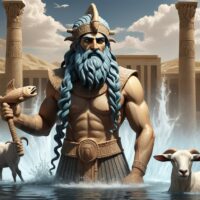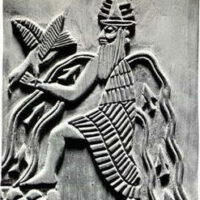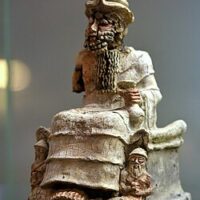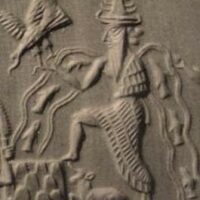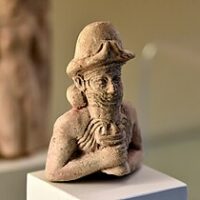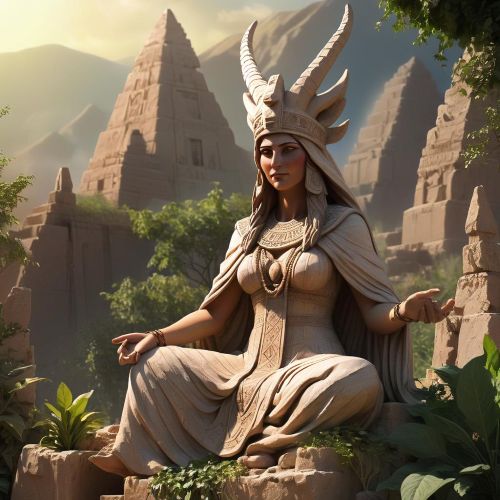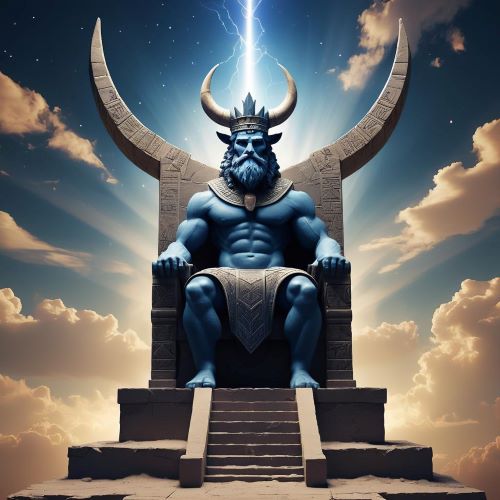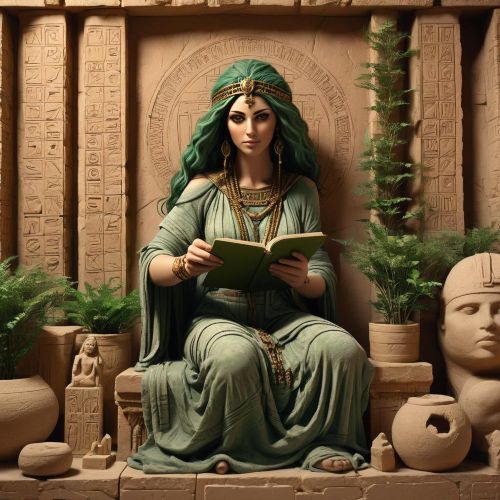Enki : God of Wisdom
Listen
Enki
Introduction
Enki, a foundational deity in Sumerian and Mesopotamian mythology, embodies life, intellect, and the hidden forces of the world. Known for his dominion over freshwater, wisdom, magic, and the act of creation itself, Enki was not just a divine figure but a guardian of balance and civilization. Unlike more aggressive or punitive gods, Enki’s role was one of compassion and guidance. He appears in many ancient texts as a helper of humanity—offering knowledge, solving divine conflicts, and shaping the very laws by which gods and humans live. His cult began in the ancient city of Eridu, and from there, his reputation and mythology flowed across Mesopotamia into Akkadian, Babylonian, and Assyrian traditions.
Physical Traits
Enki’s physical representation carries layers of symbolic meaning. He is typically portrayed as a mature, bearded man wearing a horned crown that signals divine status. Most notably, streams of water cascade from his shoulders or from vases he holds—an artistic shorthand for his authority over freshwater, rivers, and springs. This water is often filled with fish, directly linking him to fertility and abundance. His body is usually clothed in long robes covered with ancient glyphs, reinforcing his association with sacred knowledge. Another recurring element is the goat-fish creature (a hybrid that later became associated with the zodiac sign Capricorn), which serves as both a visual pun and a sacred animal linking Enki to both land and sea.
Family
Enki’s divine family tree places him at the intersection of cosmic power and earthly guidance. His father is An (also called Anu), the supreme god of the sky, while his mother, Nammu, represents the primordial waters and is credited with initiating creation. Enki’s lineage ties him to both the celestial and the chthonic—above and below—making him a deity of great balance. His brother, Enlil, often embodied divine authority and judgment, which sometimes clashed with Enki’s more diplomatic and forgiving nature.
Enki’s wife is generally identified as Ninhursag (also known as Damkina or Damgalnuna), the earth mother goddess. Their union symbolized the essential cooperation between water and earth, intellect and fertility. Together, they parented numerous divine offspring, including deities such as Marduk, the future patron god of Babylon; Ninsar, linked with vegetation; and Asalluhi, associated with magic and healing. These children extended Enki’s influence into key aspects of Mesopotamian life, from agriculture and justice to medicine and theology.
Other names
Over the centuries, Enki was known by multiple names that reflected the languages, cultures, and spiritual needs of different societies. In Akkadian mythology, he is most widely recognized as Ea, a name that persisted through Babylonian and Assyrian narratives. The Akkadians also used epithets like Nudimmud, meaning “the fashioner,” which emphasized his creative role in shaping the world and mankind.
Other names attributed to him include Nagbu, meaning “source” or “spring,” directly referencing the life-giving underground waters he commanded. He was also referred to as Niššīku, which roughly translates to “wise ruler” or “advisor,” highlighting his role as a counselor in divine affairs. These diverse titles reflect his wide-ranging responsibilities, from magician and healer to kingmaker and engineer of humanity’s fate. In comparative studies, Enki has even been loosely connected to other wisdom or water deities such as the Greek Poseidon and Egyptian Ptah, though such parallels are more symbolic than literal.
Powers and Abilities
Enki’s influence extends across a broad spectrum of divine functions. As the god of fresh water, he controlled the underground aquifers that fed rivers and irrigation canals—crucial in a desert-adjacent land like Mesopotamia. He was also the god of ritual and sacred knowledge, with command over purification ceremonies, incantations, and protective charms. His powers included not only magical capabilities but the deep wisdom needed to manage cosmic justice and resolve disputes among gods and men alike.
One of Enki’s most famous attributes is his cleverness. He is often cast in the role of the trickster—but not in a chaotic or malevolent sense. Rather, Enki uses his wit to defuse dangerous situations. In the myth of Atrahasis (an early version of the Noah’s Ark story), Enki defies the divine council’s plan to destroy humanity with a flood and discreetly instructs a righteous man to build a survival vessel. Through such stories, Enki comes across as an advocate for human welfare, even when doing so risks divine punishment.
He also played a central role in the creation of humanity. According to one myth, when the gods grew weary of laboring to maintain the world, Enki and Nammu fashioned humans out of clay mixed with divine essence. This act wasn’t merely about populating the Earth—it was about embedding purpose, responsibility, and potential into human beings, connecting them to the divine order.
Modern Day Influence
Although millennia have passed since Enki’s name was inscribed in cuneiform on clay tablets, his symbolic presence continues to inspire and influence modern thought, art, and spirituality. In psychological studies, Enki represents the archetype of the wise old man—the mentor who empowers others through knowledge rather than force. His myths offer early expressions of ethical leadership, environmental balance, and problem-solving rooted in compassion rather than authority.
Contemporary literature, film, and even video games have drawn on Enki’s image as a mystical water god or sage. His legacy as a life-giving force has made him a favorite figure in neopagan and reconstructionist spiritual practices. In these circles, Enki is often honored as a symbol of equilibrium between intellect and nature.
One noteworthy real-world homage to Enki is Enki Health Services, a healthcare organization in California. Named for the ancient god, it focuses on mental well-being and compassionate care, reflecting Enki’s qualities of healing, wisdom, and service to humanity.
Enki’s story also plays an important role in modern comparative mythology and historical studies, offering scholars insights into how early civilizations conceived of justice, nature, and the sacred role of knowledge. As global challenges around climate, conflict, and human rights continue to evolve, Enki’s model of wise, nurturing power offers a timeless lesson in leadership and compassion.
Related Images
Source
Enki Health Services. (2024, January 1). Who is Enki? Retrieved from https://www.enkihealth.org/who-is-enki/
Wikipedia contributors. (2002, February 25). Enki – Wikipedia. Retrieved from https://en.wikipedia.org/wiki/Enki
World History Encyclopedia. (2017, January 9). Enki. Retrieved from https://www.worldhistory.org/Enki/
University of Alabama. (2015, March 12). Enki – Ancient Art. Retrieved from https://ancientart.as.ua.edu/enki/
Forgotten Realms Wiki. (n.d.). Enki. Retrieved from https://forgottenrealms.fandom.com/wiki/Enki
Study.com. (n.d.). Enki, the Mesopotamian God | Overview, Symbols & Mythology. Retrieved from https://study.com/academy/lesson/mesopotamian-god-enki-mythology-symbols.html
Neuromuse. (2024, May 26). Introduction to Enki: The Sumerian God of Wisdom and Waters. Retrieved from https://neuromuse.ca/blogs/unveiling-the-realm-of-gods-and-legends-the-journey-behind-neuromuse-tees/introduction-to-enki-the-sumerian-god-of-wisdom-and-waters?srsltid=AfmBOopwhE2IwmPtwsyM-EQrGjKQQwQpml3EKpLcbyr2RHTzPIgE-ZwO
Black, J., & Green, A. (1998). Gods, Demons and Symbols of Ancient Mesopotamia: An Illustrated Dictionary
University of Texas Press. Kramer, S. N. (1963). The Sumerians: Their History, Culture, and Character. University of Chicago Press.
Leick, G. (2001). Mesopotamia: The Invention of the City. Penguin Books.


